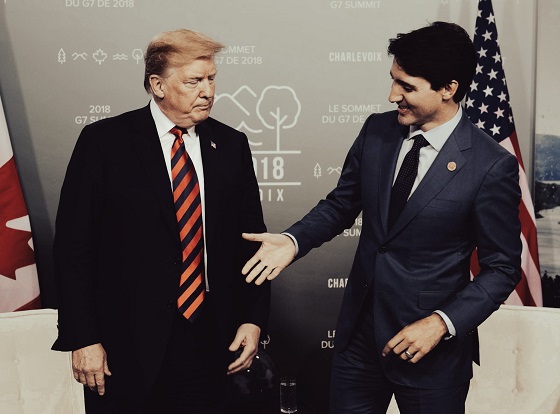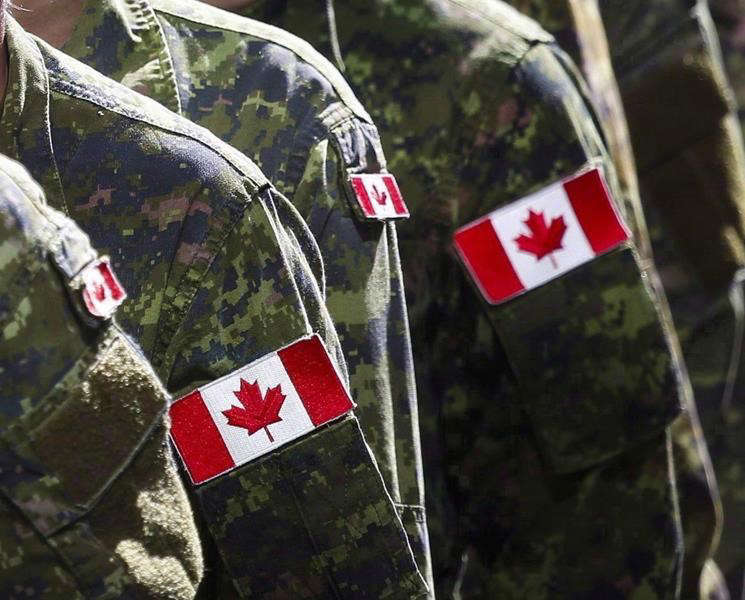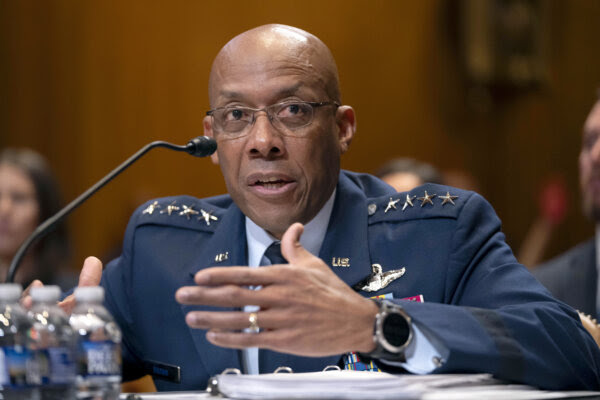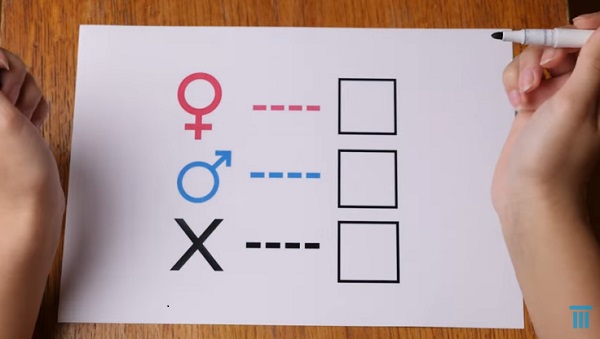armed forces
Canada among NATO members that could face penalties for lack of military spending


From the Daily Caller News Foundation
By J.D. Foster
Trump should insist on these measures and order that unless they are carried out the United States will not participate in NATO. If Canada is allowed entry to the Brussels headquarters, then United States representatives would stay out.
Steps Trump Could Take To Get NATO Free Riders Off America’s Back
In thinking about NATO, one has to ask: “How stupid do they think we are?”
The “they,” of course, are many of the other NATO members, and the answer is they think we are as stupid as we have been for the last quarter century. As President-elect Donald Trump observed in his NBC interview, NATO “takes advantage of the U.S.”
Canada is among the “they.” In November, The Economist reported that Canada spends about 1.3% of GDP on defense. The ridiculously low NATO minimum is 2%. Not to worry, though, Premier Justin Trudeau promises Canada will hit 2% — by 2032.
A quarter of NATO’s 32 members fall short of the 2% minimum. The con goes like this: We are short now, but we will get there eventually. Trust us, wink, wink.
The United States has put up with this nonsense from some members since the collapse of the Soviet Union. That is how stupid we have been.
Trump once threatened to pull the United States out of NATO, then he suggested the United States might not come to the defense of a NATO member like Canada. Naturally, free-riding NATO members grumbled.
In another context, former Army Lt. Gen. Russell Honore famously outlined the first step in how the United States should approach NATO: Don’t get stuck on stupid.
NATO is a coalition of mutual defense. Members who contribute little to the mutual defense are useless. Any country not spending its 2% of GDP on defense by mid-year 2025 should see its membership suspended immediately.
What does suspended mean? Consequences. Its military should not be permitted to participate in any NATO planning or exercises. And its offices at NATO headquarters and all other NATO facilities should be shuttered and its citizens banned until such time as their membership returns to good standing. And, of course, the famous Article V assuring mutual defense would be suspended.
Further, Trump should insist on these measures and order that unless they are carried out the United States will not participate in NATO. If Canada is allowed entry to the Brussels headquarters, then United States representatives would stay out.
Nor should he stop there. The 2% threshold would be fine in a world at peace with no enemies lurking. That does not describe the world today. Trump should declare the threshold for avoiding membership suspension will be 2.5% in 2026 and 3% by 2028 – not 2030 as some suggest.
The purpose is not to destroy NATO, but to force NATO to be relevant. America needs strong defense partners who pull their weight, not defense welfare queens. If NATO’s members cannot abide by these terms, then it is time to move on and let NATO go the way of the League of Nations.
Trump may need to take the lead in creating a new coalition of those willing to defend Western values. As he did in rewriting the former U.S.-Mexico-Canada trade agreement, it may be time to replace a defective arrangement with a much better one.
This still leaves the problem of free riders. Take Belgium, for example, another security free rider. Suppose a new defense coalition arises including the United States and Poland and others bordering Russia. Hiding behind the coalition’s protection, Belgium could just quit all defense spending to focus on making chocolates.
This won’t do. The members of the new defense coalition must also agree to impose a tariff regime on the security free riders to help pay for the defense provided.
The best solution is for NATO to rise to our mutual security challenges. If NATO can’t do this, then other arrangements will be needed. But it is time to move on from stupid.
J.D. Foster is the former chief economist at the Office of Management and Budget and former chief economist and senior vice president at the U.S. Chamber of Commerce. He now resides in relative freedom in the hills of Idaho.
armed forces
Canada’s Military is Collapsing. Without Urgent Action, We Won’t Be Able To Defend Ourselves

From the Frontier Centre for Public Policy
By David Leis
Decades of underfunding and political neglect have left our military weak and unprepared
What Lt.-Gen (retired) Michel Maisonneuve (ret.) told me about Canada’s military was nothing short of alarming. He didn’t mince words—our armed forces are in dire straits. If we don’t act now, Canada will not only be unable to defend itself, but it will cease to be taken seriously by our allies, many of whom are already losing patience with our military decline.
Maisonneuve has seen firsthand what a functioning military looks like. He has served at the highest levels, working alongside our allies in NATO, and he knows exactly what Canada is failing to do. “We are no longer at the table when major defence decisions are made,” he told me. “The Americans don’t ask us what we think anymore because they know we can’t contribute.” That is a stunning indictment of where we now stand—a country that was once respected for its ability to punch above its weight militarily has been reduced to an afterthought.
The problem, as Maisonneuve laid out, is both simple and staggering: Canada doesn’t take its defence seriously anymore. The government has allowed our forces to wither. The Air Force is still buying CF-18s from the 1980s because the long-delayed F-35 procurement is years behind schedule. The Navy, once a competent maritime force, is barely functional, with no operational submarines and a fleet that is nowhere near what is needed to patrol our vast coastlines.
Meanwhile, the Army is struggling to recruit and retain soldiers, leaving its numbers dangerously low. “We have an Army in name only,” Maisonneuve said. “If we were called upon tomorrow to deploy a fully operational combat force, we couldn’t do it.”
Even more shocking is the state of readiness of our troops. A recent report found that 75 per cent of Canadian military personnel are overweight. Maisonneuve didn’t sugarcoat it:
“It’s unacceptable. We are supposed to be training warriors, not watching fitness standards collapse.” When the people entrusted with defending our country are struggling with basic physical fitness, it speaks to something much deeper—an institutional rot that has infected the entire system. Our allies have noticed. Canada was locked out of AUKUS, the military alliance between the U.S., the U.K. and Australia. “It wasn’t an oversight,” Maisonneuve explained. “It was a deliberate snub. The Americans don’t see us as a serious defence partner anymore.” That snub should have been a wake-up call. Instead, our government shrugged it off.
Meanwhile, Washington is openly questioning Canada’s value in NATO. The Americans see the numbers—Canada refuses to meet even the minimum defence spending requirement of two per cent of GDP. Instead of fulfilling our obligations, we offer up empty promises and expect others to pick up the slack.
Maisonneuve is blunt about what needs to be done. “First, we need to fully fund the military—and that means not just hitting the NATO target but exceeding it. Our allies spend real money on their defence because they understand that security is not optional.” He suggests Canada should aim for at least 2.5 per cent of GDP, not just as a show of commitment but as a necessity to rebuild our capabilities. Beyond money, Maisonneuve argues that military culture must be restored.
“We’ve allowed ideology to creep into the ranks. The military’s primary function is to defend the nation, not to serve as a social experiment,” he said. “We need to get back to training warriors, not worrying about whether we’re ticking the right diversity boxes.” He believes a return to a warrior ethos is essential— without it, the military will remain directionless.
Procurement is another disaster that Maisonneuve insists must be fixed immediately. “We’ve spent years dithering on replacing equipment, and every delay puts us further behind,” he said. The F-35 deal should have been signed years ago, but political hesitation means we won’t see a full fleet for years. The Navy urgently needs new submarines and icebreakers, especially to secure the Arctic, where other global powers, particularly Russia, are ramping up their presence.
The biggest issue, though, is manpower. “We need to rebuild the forces, period,” Maisonneuve told me. “That means recruiting, training, and retaining soldiers, and we are failing at all three.” He even suggested that Canada should consider implementing a national service requirement, a move that would not only increase troop numbers but also instill a sense of duty and responsibility in younger generations. “We used to be a country that took security seriously,” he said. “What happened?”
That’s the question, isn’t it? What happened to Canada? How did we go from being a country that contributed meaningfully to global security to one that can’t even defend itself? The reality is that successive governments have let this happen—first by neglecting funding, then by letting bureaucracy suffocate procurement, and finally by allowing the core purpose of the military to be diluted.
Maisonneuve is clear: Canada must act now, or it will cease to be taken seriously.
David Leis is President and CEO of the Frontier Centre for Public Policy and host of the Leaders on the Frontier podcast
armed forces
Trump fires chairman of Joint Chiefs of Staff, appoints new military leader


From the Daily Caller News Foundation
By Mariane Angela
President Donald Trump announced Friday the dismissal of General Charles Brown, the current Chairman of the Joint Chiefs of Staff.
In a post on Truth Social, Trump expressed his gratitude toward Brown for his extensive contributions and leadership, wishing him and his family a prosperous future. Brown’s departure marks a pivotal moment in U.S. military leadership following over 40 years of service.
“I want to thank General Charles “CQ” Brown for his over 40 years of service to our country, including as our current Chairman of the Joint Chiefs of Staff. He is a fine gentleman and an outstanding leader, and I wish a great future for him and his family,” Trump wrote.
Simultaneously, Trump introduced his nominee for Brown’s successor.
“Today, I am honored to announce that I am nominating Air Force Lieutenant General Dan “Razin” Caine to be the next Chairman of the Joint Chiefs of Staff. General Caine is an accomplished pilot, national security expert, successful entrepreneur, and a “warfighter” with significant interagency and special operations experience,” Trump said.
Trump said Caine’s appointment comes after he was overlooked for advancement during former President Joe Biden’s presidency.
“General Caine was passed over for promotion by Sleepy Joe Biden. But not anymore! Alongside Secretary Pete Hegseth, General Caine and our military will restore peace through strength, put America First, and rebuild our military,” Trump said. President Trump also announced plans to appoint five additional senior military officials, tasks he has delegated to Secretary Hegseth.
It was reported Thursday that Hegseth plans to dismiss Brown as part of President Trump’s commitment to eliminate “wokeness” from the military. Brown reportedly appears on a list of proposed removals submitted to Congress.
Brown had previously expressed his wish to retain his position even after Trump took office, and according to sources speaking to NBC News in Dec. 2024, Trump seemingly moderated his views on the general. Biden nominated Brown as chairman in 2023, and despite a heated confirmation hearing where senators scrutinized his alleged implementation of racial quotas in Air Force hiring practices, he was confirmed.
Meanwhile, Brown’s replacement, Caine, took office as the associate director for Military Affairs at the CIA on Nov. 3, 2021, after serving as the director of Special Programs at the Pentagon. Lt. Gen. Dan Caine, an F-16 pilot with extensive experience including over 150 combat hours, was commissioned in 1990 and has held numerous key roles, from the White House staff to special operations, and balances his military career with entrepreneurial ventures.
-

 Uncategorized1 day ago
Uncategorized1 day agoPoilievre on 2025 Election Interference – Carney sill hasn’t fired Liberal MP in Chinese election interference scandal
-

 Business2 days ago
Business2 days agoCuba has lost 24% of it’s population to emigration in the last 4 years
-

 2025 Federal Election1 day ago
2025 Federal Election1 day ago2025 Federal Election Interference from China! Carney Pressed to Remove Liberal MP Over CCP Bounty Remark
-

 International2 days ago
International2 days agoTrump signs executive order to make Washington D.C. “safe and beautiful”
-

 Media1 day ago
Media1 day agoTop Five Huge Stories the Media Buried This Week
-

 2025 Federal Election1 day ago
2025 Federal Election1 day ago2025 Election Interference – CCP Bounty on Conservative Candidate – Carney Says Nothing
-

 Aristotle Foundation2 days ago
Aristotle Foundation2 days agoCanada has the world’s MOST relaxed gender policy for minors
-

 Censorship Industrial Complex23 hours ago
Censorship Industrial Complex23 hours agoWelcome to Britain, Where Critical WhatsApp Messages Are a Police Matter









